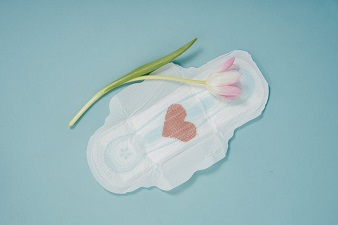Will Blocked Fallopian Tubes Cause Early Menstruation?
Blocked fallopian tubes may lead to early menstruation because the fallopian tubes and ovaries in a female patient's body are very close. Therefore, if the fallopian tubes are inflamed, they will soon spread to the women's ovaries, destroying the ovaries' normal function. Eventually, it may cause menstrual disorders.

Other symptoms of blocked fallopian tubes
1. Dysmenorrhea: Due to obstruction of the fallopian tubes in women, it may cause women's pelvic congestion, which will cause stasis dysmenorrhea. When a female patient has menstruation, this pain will be more serious.
2. Abdominal discomfort: Due to blocked fallopian tubes in women, there will be many abdominal discomforts. The more common one is that women often have pain in the lower back, and the sacrum will feel sore and have a significant feeling of falling. These problems will be aggravated when tired.
3. Others: Female patients may have more leucorrhea, and in this case, women's gastrointestinal tract will become more abnormal. And often feel weak.
4. Infertility: Infertility is also one of the symptoms of fallopian tube blockage. The fallopian tube is damaged by the damage, forming a bottleneck and causing infertility, and secondary infertility is more common.
Causes of blocked fallopian tubes
1. Gynecological inflammation. Chronic pelvic inflammatory disease can lead to partial or complete atresia of the end of the fallopian tube that accepts the egg, or adhesion of the inner mucosa of the fallopian tube, narrowing or atresia of the lumen.
If it is severe inflammation, it can cause the fallopian tube to lose its soft and peristaltic physiological properties, become stiff, twisted, and completely block the lumen, eventually making it lose fertility. Salpingitis can cause adhesions between the narrowest part of the fallopian tube and the umbrella end, resulting in narrowing or complete atresia of the lumen, resulting in infertility.
2. Perforated appendix. Women with a history of appendix perforation have an increased chance of damage to their fallopian tubes. The distance between the appendix and the fallopian tube is very close, so the infection in the appendix can quickly spread to the fallopian tube, causing inflammation of the fallopian tube, and eventually the phenomenon of adhesion and blockage, leading to infertility.
3. Pelvic adhesions. This condition usually covers the ends of the ovaries and fallopian tubes or sticks the fallopian tubes and other tissues together. Especially for women who have undergone pelvic surgery, most of them will have adhesion problems.
4. Infection caused by abortion. A miscarriage can also cause inflammation of the reproductive organs, which may leave scar tissue in the fallopian tube, which can block or damage the inside of the fallopian tube.
How to treat blocked fallopian tubes
1. Medication
The cause of the blockage of the fallopian tubes is related to salpingitis. And it is mainly chronic inflammation, so most of them are treated with drugs, especially herbal medicines, with excellent curative effects. The herbal medicine Fuyan Pill is aimed explicitly at female reproductive diseases. Its ingredients are safe, and long-term use can also nourish the body and dredge the meridians. Fuyan Pill has the effect of promoting blood circulation and removing blood stasis, which can dredge the fallopian tube.
2. Surgical treatment
(1) Fallopian tube drainage: it can be performed after three days after menstruation is clean. One hundred sixty thousand units of gentamicin, 2 ml of 2% procaine, 5 mg of dexamethasone, and 5 mg of α-chymotrypsin were dissolved in 20 ml of normal saline and injected into the uterine cavity through a tubal drainage catheter. Once every other day, stop treatment before ovulation. It can be treated continuously for 2 to 3 menstrual cycles. Most medical institutions still use this therapy, but the curative effect is poor, and the false positive rate is high.
(2) Conventional surgical treatment: tubal stoma, adhesion separation, tubal anastomosis, hysterosalpingist implantation, etc., are performed on the diseased fallopian tube. Conventional surgery has large incisions and slow recovery after surgery.
Women Must Aware 6 Tubal Blockage Triggers
previous pageWhy does A Woman Have Blocked Fallopian Tubes Without Induced Abortion?
next page
You may also be interested in
- Blocked Fallopian Tubes? Traditional Chinese Medicine Might Help
- Why do Some People Choose IVF after Being Diagnosed with Blocked Fallopian Tubes?
- How to Treat Congenital Tubal Blockage?
- Why Can't Pregnancy Be Achieved Despite Repeated Tubal Flushing for Blocked Fallopian Tubes?
- When Preparing for Pregnancy, Blocked Fallopian Tubes May Be Related to These Three Factors
Testimonials
- Adenomyosis with Ureaplasma Urealyticum Cured by Fuyan Pill
- Tubal blockage with hydrosalpinx can be cured by TCM shortly
- Fuyan Pill Helps A woman with Adenomyosis Get Pregnant
- A Woman with Hydrosalpinx Is Cured with Fuyan pill
- Pelvic Inflammatory Disease Testimonials
- Irregular Vaginal Bleeding and Endometrial Thickening Cured by Fuyan Pill
- Pruritus Vulvae and Frequent Urination: Mycoplasma Infection Cured after 2 Courses



